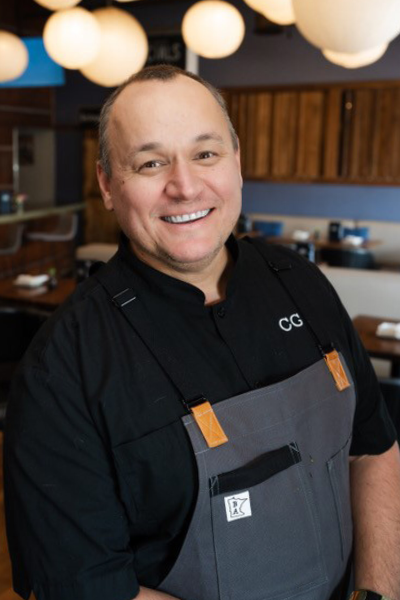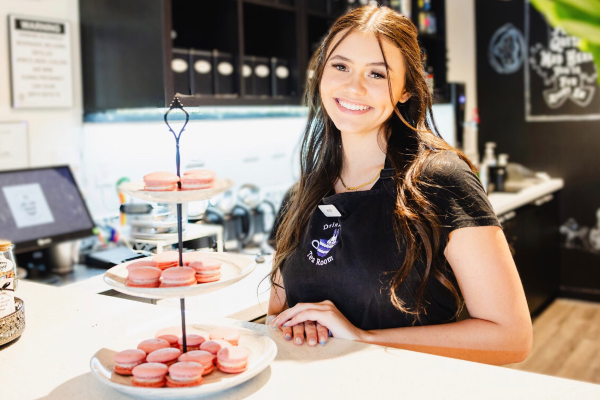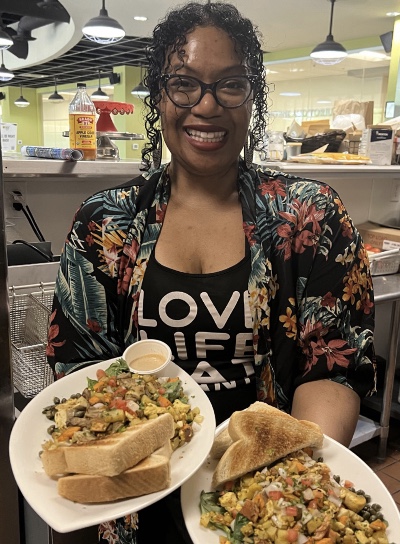BY ALISON BAILIN BATZ
Chefs know good food, but which local talents are using progressive, sustainable practices to dish it out on a daily basis? Green Living recently had the chance to sit down with several Arizona chefs and restaurant operators to talk in depth about how they’re leading the charge for a greener culinary scene.
THE LIVING ROOM, SEA & SMOKE, CHOP CHANDLER, AND ROCK LOBSTER
According to Executive Chef Christopher George, who oversees each of the four eateries, the local favorites source all of their meat, fish, and shellfish from sustainable sources, ensuring that every dish not only impresses guests but also supports responsible and eco-friendly practices. The restaurants also incorporate low-flow faucets and waterless toilets, along with water-efficient dishwashers and other equipment to help conserve water and reduce utility costs. In addition, the restaurants compost scraps and donate surplus food to local shelters.
DRINK ME! TEA ROOM
Owner Melissa Harlan and daughter Haley, who serves as chef, are exceptionally proud that their gorgeous concept is a Green Certified Business by Local First Arizona. Every tea blend and menu item is carefully sourced from ethical suppliers who share the same commitment to reducing environmental impact. From organic teas to locally sourced, vegan, and organic ingredients, every cup and tea tray served is a testament to conscious choices that prioritize the planet’s well-being. In a world where dietary preferences often lead to increased food waste, Drink Me! has found a way to cater to diverse needs without compromising on sustainability.

The restaurant’s entirely vegan and gluten-free menu not only ensures inclusivity but aligns with a lower carbon footprint, as plant- based options require fewer resources to produce and have a significantly reduced impact on the environment compared to animal-based counterparts. What little waste is produced — including tea leaves, paper products, and food — is composted in partnership with The Orchard Community Learning Center, a local non-profit learning farm in South Phoenix.

ATRIA RESTAURANT
This James Beard Award nominee takes great pride in minimizing its environmental impact while providing exceptional dining experiences. In addition to focusing on hyper-local sourcing and offering plant-based dishes to lower environmental impact, according to chef-owner Rochelle Daniel, Atria minimizes waste and diverts organic materials from landfills by repurposing scrap products. The restaurant also uses energy-efficient appliances and lighting to reduce energy consumption and lower greenhouse gas emissions; has adopted practices to reduce water usage, including low-flow fixtures and efficient dishwashing techniques; and collaborates with suppliers who adhere to sustainable practices, ensuring that ingredients are sourced responsibly. Daniel designed the menu to highlight dishes that use less resource-intensive ingredients, such as grains, legumes, and seasonal vegetables. She also sources seafood from local sustainability leader Chula Seafood and uses biodegradable or recyclable packaging materials for all takeout and delivery services.
Atria has a training program for its staff focused on eco-friendly operations and hosts events that promote sustainability, such as farm-to-table dinners and workshops on cooking with local ingredients. The efforts of Daniel and her team have been recognized with a sustainability award from the city of Flagstaff, highlighting their dedication to promoting sustainable practices in the restaurant industry.
ATLASTA CATERING
This Arizona icon believes in an all-encompassing sustainability philosophy that touches every facet of the organization. Over the past seven years, according to Chief Culinary Officer and chef Steven Short, Atlasta has successfully navigated how to operate zero-landfill kitchens and zero-landfill events, a true rarity in the industry. Recently, the company eliminated all single-use plastics from its full-service catering division. While recyclable, these items still had an environmental trade-off that Short and his team found unacceptable. Atlasta’s academic and scientific partnerships include teaching senior-level students at ASU’s Global Institute of Sustainability and Innovation and the Walter Cronkite School of Journalism in the areas of business, ethics, and sustainability. Short has even been featured as a subject matter expert at national sustainability conferences, served as a member of the ASU Wellness Committee, and has participated as a member of the Sustainable Food Task Force that is involved in ASU’s purchasing and sourcing of food. Finally, over the past 13 years, Atlasta has donated over one million pounds of food, which is equivalent to 600,000 meals.
DER WURST HOT DOGS
Owner Nicholas Hyche is on a mission to make Der Wurst one of Arizona’s top sustainable small businesses. He currently composts 100% of all food waste and more than 90% of all paper and bar waste. All of his service ware – forks, knives, bar straws, sauce cups, and paper liners – are compostable by design. You won’t find plastic of any kind in his kitchen, save for a very small amount of plastic wrap only used when absolutely necessary. Hyche uses 100% locally made sausages and bread, all from suppliers within five miles of his location.

Hyche has also switched to all LED lighting and put all lights on timers; installed low-water usage dishwashers; and 100% of usable food from special events is donated to a local nonprofit that disperses food to those in need in addition to stocking community fridges. Waste items are given to R.City, who turns these items into healthy compost to help improve growing conditions in the desert.
EARLY BIRD VEGAN
Chef and concept owner Krystal Mack has been deeply committed to making a difference, whether working on her backyard international farm with her mom and dad — digging holes, watering plants, and picking peppers — or recognizing the importance of our planet’s future. In seventh grade, Mack and her fellow student council members initiated a program called Flick and Stack, which focused on recycling styrofoam trays from school lunches. These days, Mack’s efforts at Early Bird include a menu that is 100% plant-based, as well as composting 100% of the restaurant’s food scraps with R.City. She plans to source produce grown from the very food scraps that the organization collects. Early Bird was also a key participant in Feed Phoenix, contributing to the 379,679 locally sourced meals delivered to food- insecure families during the height of the COVID-19 pandemic between 2020 and 2023.






